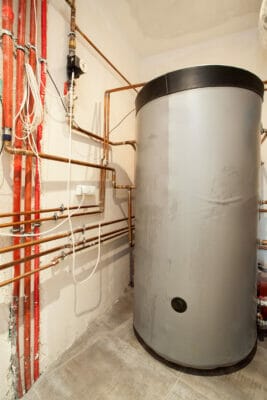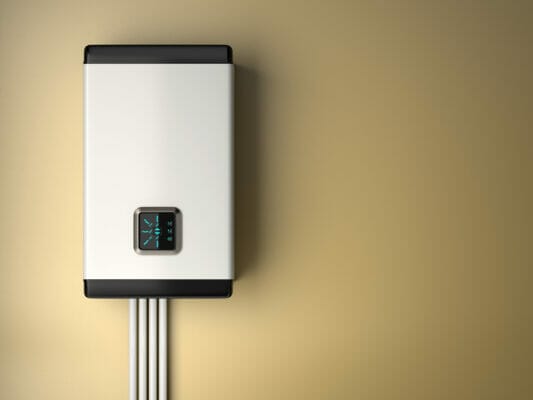Disclaimer: This post may contain affiliate links, meaning we get a small commission if you make a purchase through our links, at no cost to you. For more information, please visit our Disclaimer Page.
It’s a good idea to switch off the water heater at night because you won’t require a lot of warm water. Most systems are highly insulated, and the temperature of the water in the heater drops extremely slowly when it is not in use.

When you aren’t using hot water, this retains the water at a comfortable temperature for several hours.
Table of Contents
When Should You Turn Off Your Water Heater?
There are different circumstances when the main water supply is turned off. When that happens, it’s safe to keep the water heater off and prevent too much heat or pressure from building up within the heater tank.
That’s because the tank could be empty or close to it and may not be refilled for long, or the main water supply loses pressure.
Moreover, if the water heater leaks due to valve malfunction, age, or any other reason, you should turn off the appliance and shut off the water supply until the issues have been resolved.
Should I Turn My Water Heater Off at Night?
If you’re using an electric water heater, your billing could be on- and off-peak charges. Typically, after midnight rates are the lowest rates.
Hence, you can turn the heater on during these times and turn it off when the rates are high. This can work better if you have an oversized unit that could supply your whole day’s requirements.
Does Turning Off the Water Heater Save Money?
A small amount of heat escapes whenever the heater is turned on, even if the unit is well insulated.
Thus, it’s common for people to turn off a water heater to save money. Typically, turning it off could save up to 10 percent of your monthly bill and prevent additional energy loss.
Is It Cheaper to Keep Your Water Heater on All the Time?
It’s isn’t cheaper to leave your water heater on all the time. Unless you need a constant supply of hot water, the boiler will be firing up and using energy constantly even when there’s no real need.
Thus, it’s cheaper and more energy-efficient to switch the boiler on only when you need hot water.
That’s because depending on the water heater’s insulation (tank, boiler, cylinder, pipes), the water temperature will keep going down. The water heater will then try to keep the water temperature at the set high temperature, which means consuming more energy continuously.
Why Do Some People Say That It Is Cheaper to Keep Your Hot Water Heater on All the Time?
When you leave your heater on, the boiler will constantly work to keep the temperature at the set level, while turning it on and off at set times will only heat water at a specific time.
However, the boiler will have to work harder to heat the water from the cool to the required temperature.
As such, people might assume that keeping the heater on continuously will prevent the temperature from going down, and it might take more energy to heat it again.
However, the assumption is false as leaving the heater on will accumulate energy consumption exceeding that required to heat the water again.
How Do You Turn Off Your Water Heater?
If you have an electric water heating system, you can find the on/off switch on the front of the unit that can turn off the unit. If you have a gas heater, close off the gas valve attached to the appliance.
Should You Turn the Water Heater Off When Going on Vacation?
When you’re going on vacation or plan on being away for an extended period, it might seem logical to shut off the heater to save energy. However, that can be disruptive and hard on the device.
Besides, if you live in areas with icy climates, it might be risky to turn off the heater. Water heaters usually maintain the tank’s temperature, and if the temperature is too cold, the pipes may become frozen or even burst.
So instead, you should set the water heater for VAC mode (a feature on newer heater models).
Alternatively, you could turn the water temperature to 50 degrees (usually, the heater keeps the water at a temperature between 120 degrees and 130 degrees Fahrenheit).
That will help you save energy without risking other issues such as overloading when turning it back on.
What Should You Do to Lower Water Heater Energy Consumption Rates?
Invest In Modern Appliances
Many modern water heater models have cylinders that hold heated water. In addition, the cylinder is typically well-insulated to maintain the proper temperature.
That ensures the heated water remains at or very near the optimum temperature for several hours without running the electric elements or boiler to heat the water.
You should also check your electrical units in the house as some, for instance, modern dishwashers, can heat water on their own and don’t require a supply of hot water from the water heater.

Use Instant or Tankless Hot Water Heaters
You can use instant or tankless heaters as they are more efficient and produce hot water on demand. That enables you to relax, and no need to turn it off at any time.
You can leave the unit on continuously, and it will consume energy only whenever you need hot water. That’s because after heating the water, the heater doesn’t take more energy as other conventional heaters do.
Similarly, a combi boiler only heats water when you need to use it by opening a tap. Thus, you may not need to switch it off because it switches on and off automatically.
Invest In Extra Insulation or A Convection Blocker
Since the standby losses are approximately 35% of the total, you can add extra insulation to the tank. Moreover, you can install a convection blocker that prevents heated water from convecting upwards and cooling.
Use Smart Thermostats
Smart thermostats are excellent for regulating the heater operation to save energy and money.
You can connect the thermostat to the boiler to control its operation depending on your schedule (that is, the hours you need it to work to provide hot water).
You could also turn the thermostat down until you achieve the coolest temperatures that still meet your needs. This can lower your energy consumption costs.
Note that you can connect the smart thermostats to your WIFI network and can control them remotely from your phone.
Use Water Heater Timers
Essentially, the energy used when the boiler is on all the time exceeds the energy used to get the water up to the temperature when the timer kicks over.
You shouldn’t pay for the energy required to heat the water when you aren’t using it.
Hence, you can use the countdown and programmable heater timers that turn on and off based on previous schedules or settings.
For instance, you can program your heater using the timer so that it can switch off whenever you go to bed or are out of the house. It can then switch back on to warm the water half an hour before you get up or come back to the house.
That way, you’ll find hot water once you wake up or get home while saving costs.
